The AnandTech Coffee Lake Review: Initial Numbers on the Core i7-8700K and Core i5-8400
by Ian Cutress on October 5, 2017 9:00 AM EST- Posted in
- CPUs
- Intel
- Core i5
- Core i7
- Core i3
- 14nm
- Coffee Lake
- 14++
- Hex-Core
- Hyperthreading
Ashes of the Singularity Escalation
Seen as the holy child of DirectX12, Ashes of the Singularity (AoTS, or just Ashes) has been the first title to actively go explore as many of DirectX12s features as it possibly can. Stardock, the developer behind the Nitrous engine which powers the game, has ensured that the real-time strategy title takes advantage of multiple cores and multiple graphics cards, in as many configurations as possible.
As a real-time strategy title, Ashes is all about responsiveness during both wide open shots but also concentrated battles. With DirectX12 at the helm, the ability to implement more draw calls per second allows the engine to work with substantial unit depth and effects that other RTS titles had to rely on combined draw calls to achieve, making some combined unit structures ultimately very rigid.
Stardock clearly understand the importance of an in-game benchmark, ensuring that such a tool was available and capable from day one, especially with all the additional DX12 features used and being able to characterize how they affected the title for the developer was important. The in-game benchmark performs a four-minute fixed seed battle environment with a variety of shots, and outputs a vast amount of data to analyze.
For our benchmark, we run a fixed v2.11 version of the game due to some peculiarities of the splash screen added after the merger with the standalone Escalation expansion, and have an automated tool to call the benchmark on the command line. (Prior to v2.11, the benchmark also supported 8K/16K testing, however v2.11 has odd behavior which nukes this.)
At both 1920x1080 and 4K resolutions, we run the same settings. Ashes has dropdown options for MSAA, Light Quality, Object Quality, Shading Samples, Shadow Quality, Textures, and separate options for the terrain. There are several presents, from Very Low to Extreme: we run our benchmarks at Extreme settings, and take the frame-time output for our average, percentile, and time under analysis.
All of our benchmark results can also be found in our benchmark engine, Bench.
MSI GTX 1080 Gaming 8G Performance
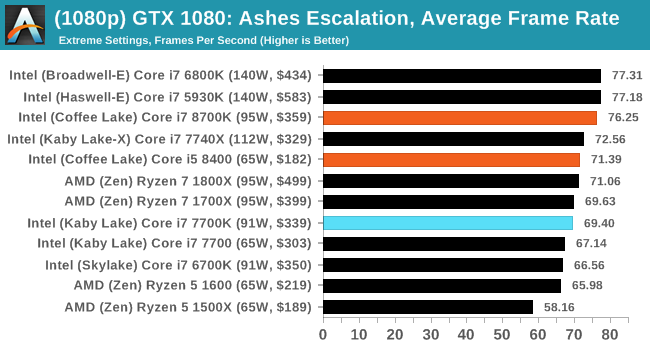
1080p

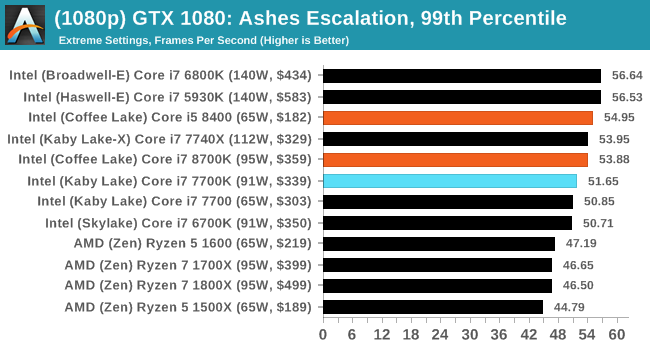
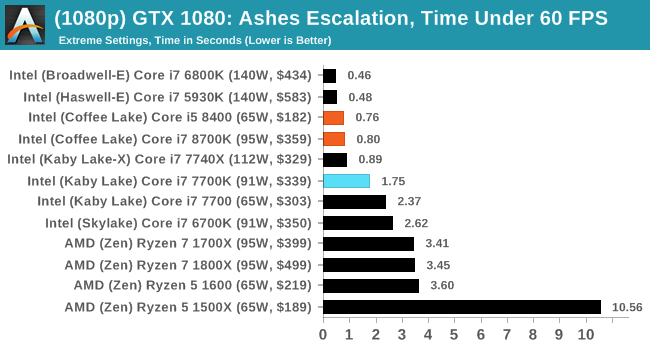
4K
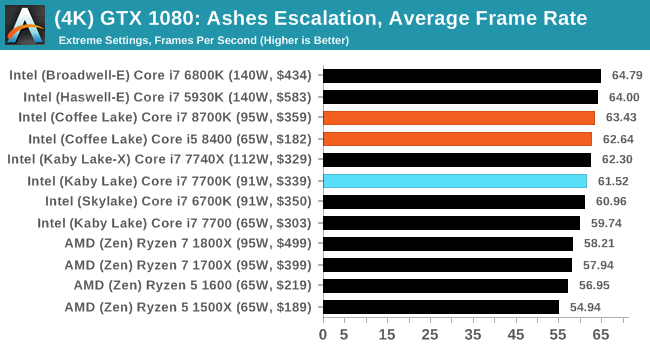
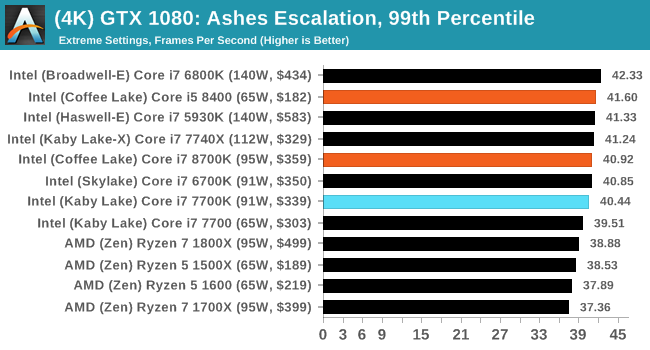
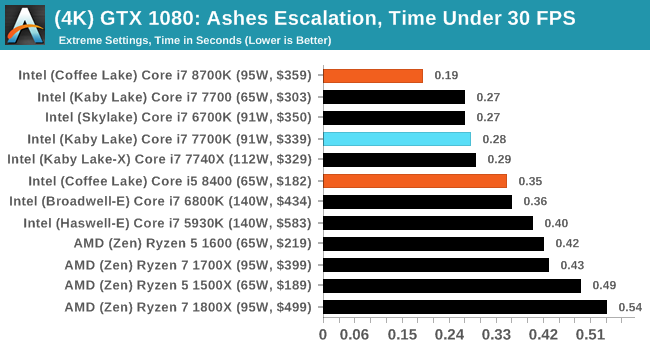


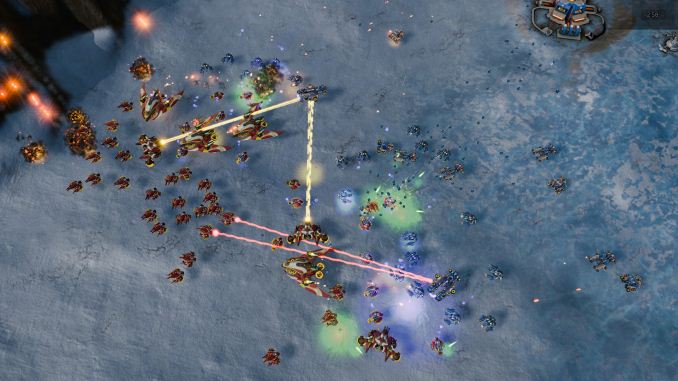
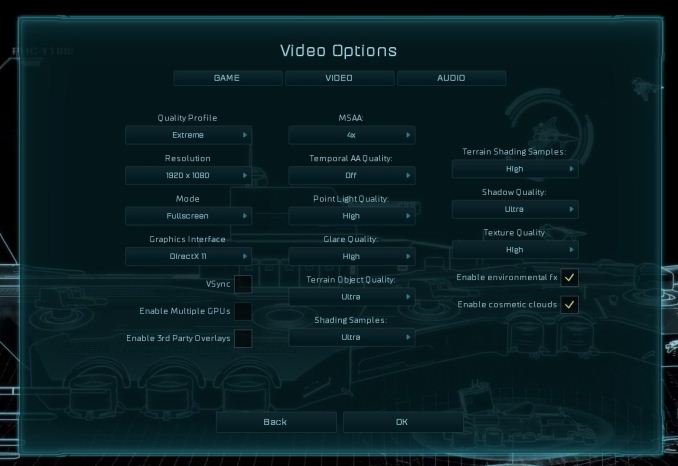








222 Comments
View All Comments
madwolfa - Thursday, October 5, 2017 - link
How in the world 8400 is so significantly faster than 7700K/8700K in all ROTR 1080p benchmarks?neo_1221 - Thursday, October 5, 2017 - link
Maybe resource contention on the hyper-threaded parts? It is odd, but I'm very impressed with that 8400. For most workloads it easily hangs out with the $300+ CPUs.risa2000 - Friday, October 6, 2017 - link
Not only RoTR but also in GTAV. I hope there is an explanation the guys at AT will figure out. If it was the congestion of the threads (as suggested above) then all Ryzen chips should be even worse, but they are not.mapesdhs - Friday, October 6, 2017 - link
According to Ian, RoTR has pure quad-core optimisations present in the engine.nsaklas - Thursday, October 5, 2017 - link
Good info Ian, thank you. Am I the only one who's terribly disappointed by this release?! I've been holding out for this moment to upgrade and what I can gather from the benchmarks is that this will have no noticeable improvement on performance for most applications vs. the last 2 gen's of CPUs....xyvyx2 - Friday, October 6, 2017 - link
yeah.. when I saw these numbers, I figured I'd go back to waiting for 10nm or Ryzen 2. But Techreport's comparison a) used a 1080ti, which I also have b) included my current cpu, the 4790k. The results were far more pronounced and closer to what I'd hoped...I'm mostly baffled by the i5-8400... if it's just 6 cores and it did so much better than the 8700k at a lower turbo clock, on those thread-crippled games, would the new i7 have done better with HT disabled? Would it run cooler with only 6 threads?
limitedaccess - Thursday, October 5, 2017 - link
I'm wondering if you can provide information on what the uncore speeds are for the various Coffeelake SKUs?limitedaccess - Thursday, October 5, 2017 - link
For example would the 8700 and 8700k possibly differ in uncore speed?Ian Cutress - Saturday, October 7, 2017 - link
Usually not, though Intel doesn't provide this information for all the chips in the stack for various (unfathomable) reasons. We've asked before.mapesdhs - Tuesday, October 10, 2017 - link
Is it possible to use cache snooping and other methods to work out uncore speeds?